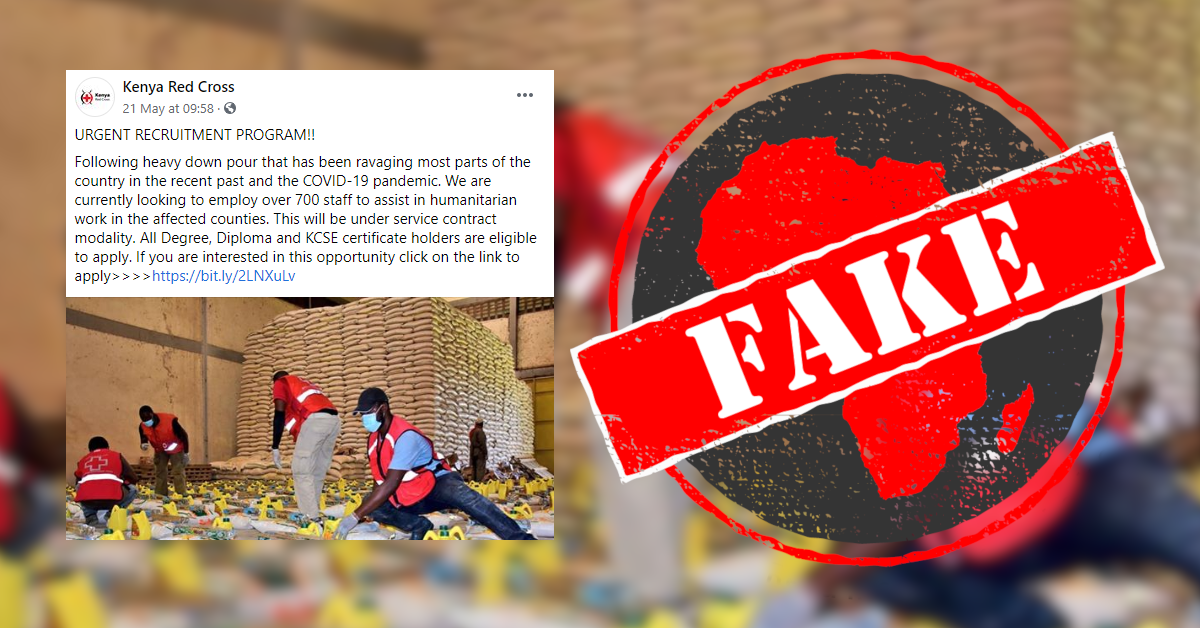A Facebook post claims that the Kenya Red Cross has launched an urgent programme to recruit people for humanitarian work in counties affected by heavy rains and the Covid-19 outbreak.
It says those with degrees, diplomas and the Kenya Certificate of Secondary Education (KCSE) are eligible for the jobs.
“Following heavy downpour that has been ravaging most parts of the country in the recent past and the COVID-19 pandemic, we are currently looking to employ over 700 staff to assist in humanitarian work in the affected counties,” the post reads.
“This will be under service contract modality. All Degree, Diploma and KCSE certificate holders are eligible to apply.”

The post includes a link to a Google Form with further instructions.
The form lists the positions supposedly available: program officer, food manager, warehouse supervisor, finance officers, medical officers and more.
But the job advert does not appear on the society’s website. And while the Google Form says the vacancies are open until 29 May 2020, the careers section of the Kenya Red Cross website shows that there are currently no positions available.
The ad also does not appear on Kenya Red Cross Facebook and Twitter pages.
The photos used in the Facebook advert, posted on Twitter by the Red Cross, are of food distribution in Nairobi’s informal settlements.
The Facebook page has 197 followers and is not verified. The official Kenya Red Cross Facebook page is verified and has more than 200,000 followers.
On 21 May Kenya Red Cross posted a screenshot of the ad on its Facebook page with “FAKE” stamped across it.
“The Kenya Red Cross Society warns members of the public not to fall victim to this fake recruitment,” it wrote.
“The Society only advertises jobs on its official platforms and daily newspapers. We also do not charge applicants any registration fee.” – Dancan Bwire
It says those with degrees, diplomas and the Kenya Certificate of Secondary Education (KCSE) are eligible for the jobs.
“Following heavy downpour that has been ravaging most parts of the country in the recent past and the COVID-19 pandemic, we are currently looking to employ over 700 staff to assist in humanitarian work in the affected counties,” the post reads.
“This will be under service contract modality. All Degree, Diploma and KCSE certificate holders are eligible to apply.”

Unverified Facebook page
The post includes a link to a Google Form with further instructions.
The form lists the positions supposedly available: program officer, food manager, warehouse supervisor, finance officers, medical officers and more.
But the job advert does not appear on the society’s website. And while the Google Form says the vacancies are open until 29 May 2020, the careers section of the Kenya Red Cross website shows that there are currently no positions available.
The ad also does not appear on Kenya Red Cross Facebook and Twitter pages.
The photos used in the Facebook advert, posted on Twitter by the Red Cross, are of food distribution in Nairobi’s informal settlements.
The Facebook page has 197 followers and is not verified. The official Kenya Red Cross Facebook page is verified and has more than 200,000 followers.
‘Don’t fall victim to fake recruitment’
On 21 May Kenya Red Cross posted a screenshot of the ad on its Facebook page with “FAKE” stamped across it.
“The Kenya Red Cross Society warns members of the public not to fall victim to this fake recruitment,” it wrote.
“The Society only advertises jobs on its official platforms and daily newspapers. We also do not charge applicants any registration fee.” – Dancan Bwire
Republish our content for free
For publishers: what to do if your post is rated false
A fact-checker has rated your Facebook or Instagram post as “false”, “altered”, “partly false” or “missing context”. This could have serious consequences. What do you do?
Click on our guide for the steps you should follow.
Publishers guideAfrica Check teams up with Facebook
Africa Check is a partner in Meta's third-party fact-checking programme to help stop the spread of false information on social media.
The content we rate as “false” will be downgraded on Facebook and Instagram. This means fewer people will see it.
You can also help identify false information on Facebook. This guide explains how.


Add new comment